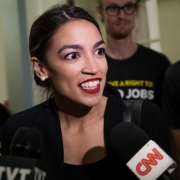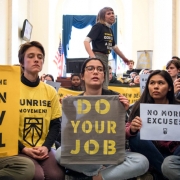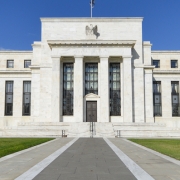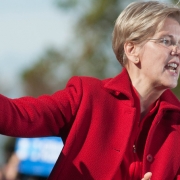The recent wave of populism spreading across America and Europe has captured the imagination of strange bedfellows. The election of President Donald Trump, the vote in favor of Brexit in the UK, and the rise of nationalist movements elsewhere, has really made an impression on global central planning elites.
Among these is the Climate Leadership Council, whose founders include former Secretaries of State, Treasury Secretaries, Harvard professors of economics, an heir to billions, a venture capitalist, and a think tank visionary with lots of political pull. In other words, the usual muckety-mucks. Their pet project is called the Carbon Dividends Plan, and their founding PR tactic is to hijack “the increasing frustration and economic insecurity that many voters feel the political establishment has failed to address.” Its stated objective “is to redirect this populist energy in a socially beneficial direction.” How nice, but how?
“The first pillar is a gradually increasing tax on carbon dioxide emissions at the mine, well, or port. A sensible carbon tax might begin at $40 per ton and increase steadily over time.” As an idea borrowed from the federal government’s baseline budgeting scam; the increases do not end. In the second pillar, “all the proceeds from this carbon tax would be returned to the American people on an equal and monthly basis” via direct deposit; and for the unbanked, PayPal or Western Union. The third pillar creates “border adjustments for the carbon content of both imports and exports to protect American competitiveness and punish free-riding by other nations.” Lastly, unnecessary regulations would be eliminated by “the enactment of a rising carbon tax whose longevity is secured by the popularity of dividends.”
A Rational View of Free Markets
The second tactic of this manifesto is to load the plan with references to “the principles of free markets” and the promise of “durable economic growth.” Before anyone invokes the glories of free markets, they should understand what that means. According to economist Murray Rothbard:
The free market and the free price system make goods from around the world available to consumers. The free market also gives the largest possible scope to entrepreneurs, who risk capital to allocate resources so as to satisfy utthe future desires of the mass of consumers as efficiently as possible. Saving and investment can then develop capital goods and increase the productivity and wages of workers, thereby increasing their standard of living. The free competitive market also rewards and stimulates technological innovation that allows the innovator to get a head start in satisfying consumer wants in new and creative ways.
But the Carbon Dividends Plan is actually a forced price system. It levies a tax at “the first point where fossil fuels enter the economy,” and an absurd system of tariffs and subsidies at our borders. Also, the scope to entrepreneurs only applies to “large scale substitution of existing energy and transportation infrastructure” in order to “stimulate new investment.” Just like hurricanes and vandalism do. Economic philosopher Frederic Bastiat explained this phenomenon a long time ago with his Broken Window Fallacy.
The Proof is in the Pandering
The Carbon Dividends Plan also claims to satisfy the desires of consumers, but with one little catch. The dividends “would be earned based on the good behavior of minimizing our carbon footprints.” The emotional tug is to pander to nationalist pride by invoking the US Constitution with “We the People deserve to be compensated.” The populist feeling “that the American political and economic system is rigged against their interests” would be soothed by a new system that “would tip the scales towards the interests of the little guy.”
And it will also increase the productivity and wages of workers. But not really, everyone gets the dividend. And not wages either, those require voluntary trade. But who cares, incomes will rise, something like a bribe. As far as rising living standards, the Carbon Dividends Plan would allow “forward-looking households” to borrow against future dividend income, but only for purchases that conform to the planner’s “effective, popular, and equitable climate solutions.” In other words, monetize an unearned asset, convert it into debt, and fund purchases from government subsidized cronies.
Like any authoritarian system, this dividends plan wouldn’t be complete without hijacking language. In this case, the debasement of the word dividend, and by extension, earned profit. The foundational tenet of free markets, advanced civilizations, and the root cause of peace and prosperity of everyone, debased along with it. So how does the Climate Leadership Council keep a straight face? Veronique de Rugy, a Senior Research Fellow at the Mercatus Center has a possible answer.
Despite the breadth of the current political divide, it appears that there is at least one thing that all politicians can agree upon: energy sector cronyism. The only real dispute is over the preferred beneficiaries.
Of Cronies and Climate
Since the Carbon Dividends Plan is riddled with unworkable ideas masquerading as sound economic policy, there must be some payoff somewhere. Is it good old fashioned regulatory quid pro quo, or is it royalties for the intellectual elites who are merely gilding their reputations as planet saviors? Yes, and power over the means of production. And while the manifesto admits “the extent to which climate change is due to man-made causes can be questioned,” it doesn’t matter. Their plan is a “simple idea” that “could strengthen our economy, benefit working class Americans, reduce regulations, and protect our natural heritage.” And it could give pigs wings, freeze hell, and invent water.
What’s really sad is how badly these planners are disconnected from reality. They think this populist surge is founded in stupidity, and can be harnessed with more crony pandering. But who is really stupid? They claim “we need an insurance policy” against those “fostering a needless climate divide” with the “international mainstream.” What they really want is an insurance policy against the spontaneous order of free people; people who are pursuing their own rational self-interests. Yes, the ones that renders their international mainstream irrelevant.













